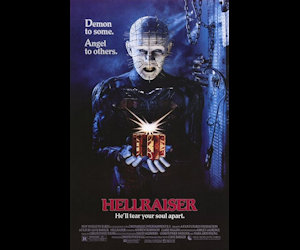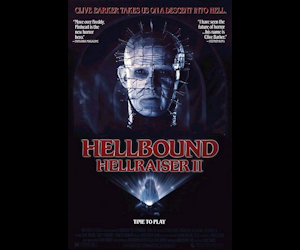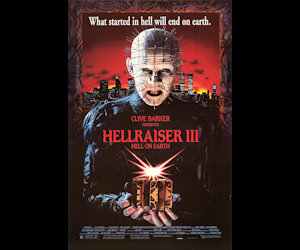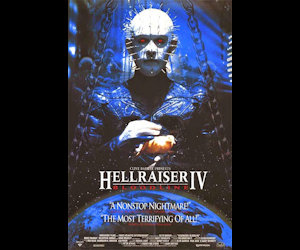Slasher Summer: The Hellraiser Reviews
You can't fully chronicle the slasher icons of the eighties without mentioning the undead Cenobite Pinhead. To be sure, he is no less iconic than Jason, Micheal Myers, or Chucky. He is arguably the most disturbed and intelligent of them all, and he has a force of personality and a familiarily with the supernatural that competes with Freddy Kreuger. However, the Hellraiser films that spawned him aren't really slasher films (with the exception of Hellraiser: Hellworld, which we'll get to shortly), because they deal in psychological horror rather than guilty pleasure serial murders.
Clive Barker's original concept for the first Hellraiser is basically a Hitchcock film on acid, and that's exactly how it plays out. It's gory and disturbing, and sure, some murders are committed, but the story centers around deeply flawed characters with twisted obsessions and secrets that embrace evil out of perverse psychosexual satisfation. Weirdly enough (and this might be revealing a bit too much), this was the series I watched as a teenager, as I was far more interested in it than the more typical slasher films of the era. Clive Barker, as a horror writer, never gets enough credit for his unique take on the genre. He peddles in the fantastic more than any of his contemporaries, and you'd have to go all the way back to H.P. Lovecraft to find any writers who even come close to his style.
Unfortunately, despite the genius behind it and the originality inherent in the concept, the Hellraiser franchise is a frustrating exercise in unrealized potential. After an ambitious start, the series deviates into formulaic territory before becoming a disjointed collection of tangentially related direct-to-video B-movie psycho thrillers that have Pinhead shoved in them just to make a buck. Marathoning the series takes a lot of endurance, patience, and low expectations, which is supremely disappointing considering the heights it could reach in the right hands. Still, it's worth doing at least once, so let's get to it.
|
HELLRAISER (1987)
|  |
|
HELLRAISER (1987)
|  |
The Premise: A husband and wife move into a house where the husband's brother (and the wife's lover), Frank, was mutilated after using a puzzle box that promised to take him to a new extreme of sadomasochistic pleasure. When Frank is resurrected, the wife brings him more victims to satiate his bloodthirst before he is found by a race of demons called Cenobites who would drag him back to the Hell from whence he came.
The Verdict: Hellraiser subverts a lot of its contemporary horror tropes to bring a more surrealist style to the genre, borrowing more from Dario Argento than John Carpenter. It's pretty sophisticated considering Barker's amateur status as a film director and the film's tiny budget. It relies more on cerebral and visual horror than on jump scares and audience manipulation, and as such, it depends on incredible special effects and a moody atmosphere, both of which are delivered in spades. Most memorable is Frank's resurrection scene, one of the greatest achievements in low-budget practical horror effects. Hellraiser is a gory, provocative film that plumbs the depths of Barker's warped mind to deliver something unique to a genre defined at the time by cheap thrills and monsters.
|
HELLBOUND: HELLRAISER II (1988)
|  |
|
HELLBOUND: HELLRAISER II (1988)
|  |
The Premise:The doctor treating Kirsty immediately after the events of Hellraiser resurrects Julia and uses the puzzle box to raise Hell once again, while Kirsty pursues him in search of her dead father.
The Verdict: Aside from some sloppy, rushed writing, the first half of Hellbound feels like a decent sequel. It picks up right where the previous one left off and tries to build upon the mythos and characters in a way that meshes with the source material (Barker's original story, "The Hellbound Heart"). It even delivers a great new villain in Dr. Channard. Things go off the rails when the box is opened, however, with surreal imagery and dream logic taking precedence over a coherent narrative and dynamic character arcs. The make-up effects are amazing, but most of the visual effects are woefully low-budget, to the point where it's difficult to infer intent. That's the biggest problem with the film in general: it's almost impossible to figure out what is actually happening. It's interesting, to be sure, but the film chokes on its own ambitions and limited production time.
|
HELLRAISER III: HELL ON EARTH (1992)
|  |
|
HELLRAISER III: HELL ON EARTH (1992)
|  |
The Premise: A New York reporter on the hunt for a story comes across the puzzle box just as Pinhead finds a way to bring Hell into the real world.
The Verdict: As it tries to turn the franchise into something more conventional, Hell on Earth feels a little out of step with the previous films, though perfectly entertaining on its own merits. The characters are pretty one-dimensional, with only Pinhead getting any real development. There are some really good action beats, but it devolves into unintentional hilarity a few too many times, especially when it comes to the unforgivably uninspired new Cenobites. There is a fantastic sequence in a church that is as deliciously blasphemous as it is pointless to the plot. While its narrative is more coherent than Hellbound, its conclusion is still fairly convoluted and convenient. I appreciate the film for its entertainment value, but it feels like a cheap follow-up to Hellraiser, never achieving its originality and never seeming to comprehend its tone.
|
HELLRAISER: BLOODLINE (1996)
|  |
|
HELLRAISER: BLOODLINE (1996)
|  |
The Premise: In the Twenty-Second Century, a man aboard the Minos Space Station attempts to trap the Cenobites and obliterate them, but he must first explain the history of the puzzle box from its inception centuries earlier.
The Verdict: This is another example of a film with ambition that far exceeds ability. There are several dozen good ideas here, but they are all thwarted by the film's tight budget, narrative constraints, sloppy writing, bad editing, and obvious studio interference. It's not a total loss, though, as much of the movie is enjoyable and interesting, especially the further back into the chronology it goes. The future space angle is the least successful and the most obviously hampered by budget, but the pre-revolutionary France is fascinating and well-done. Indeed, had this movie focused entirely on that time period and included the filmmaker's original plans to have jester-like Cenobites and a historical interpretation of Hell, it would probably have been a much better movie, though of course it would be sorely lacking in Pinhead, who for better or worse is the face of the franchise. Pinhead does get a lot of screentime and some wonderful monologues, but his overexposure and continued inability to win makes him less frightening than ever before. Ultimately, Bloodline is more failure than success, but it's worth watching in order to get more information about the complex mythos of the franchise and the puzzle box itself.
-e. magill 8/10/2017
THE UNAPOLOGETIC GEEK'S
SLASHER SUMMER: | |
|
|
|